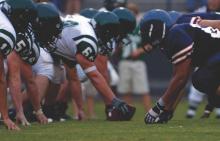Football practice is a major source of concussions in all pediatric age groups, according to a report published online May 4 in JAMA Pediatrics.
“Concussions during practice might be mitigated and should prompt an evaluation of technique and head impact exposure. Although it is more difficult to change the intensity or conditions of a game, many strategies can be used during practice to limit player-to-player contact and other potentially injurious behaviors,” said Thomas P. Dompier, Ph.D., of the Datalys Center for Sports Injury Research and Prevention, Indianapolis, and his associates.
A recent Institute of Medicine report emphasized the need for better data regarding the incidence of concussion among athletes aged 5-23 years. In what they described as the first study of its kind, the investigators assessed information pertaining to concussion during two consecutive football seasons from three large injury surveillance programs: the Youth Football Safety Study, which included 118 teams of players aged 5-14 years; the National Athletic Treatment, Injury, and Outcomes Network, which included 96 teams of high school players; and the National Collegiate Athletic Association Injury Surveillance Program, which included 24 teams of college players.
A clear majority of concussions in the older age groups – 57.7% among high schoolers and 57.6% among college athletes – occurred during practice. A smaller but still substantial proportion of concussions (46% ) in the youngest age group occurred during practice. The lower percentage among players aged 5-14 years may be attributable to their lesser exposure. Youth football teams typically practice only once or twice per week and have only 20-25 players per team, while high school and college teams have many more practices per week and typically have 75-110 players per team, the investigators reported (JAMA Ped. 2015 May 4 [doi:10.1001/jamapediatrics.2015.0210]).
Based on these findings, an estimated 1 in 30 youth football players, 1 in 14 high school players, and 1 in 20 college players sustain at least one concussion every year, the investigators added. The study results indicate that limiting contact during practices would help control the risk of concussion among football players of all ages, Dr. Dompier and his associates said.

